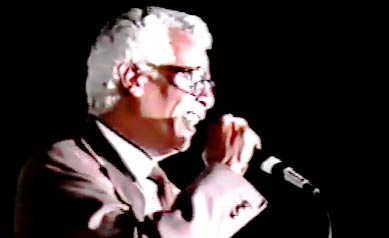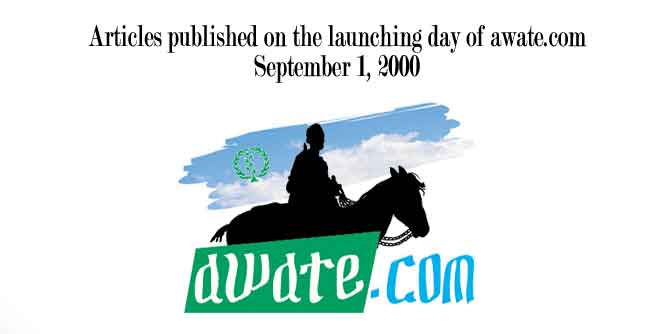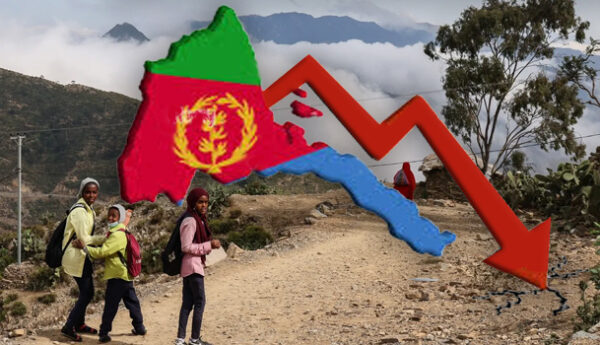The Legendary Alamin Abdullatif

This is the second portion of my earlier article, “A window to Eritrean Music and Dance.” This time it is about the icon of Eritrean songs, Ustaz Alamin Abdulatif.
Born in 1942, in Abashawl, Asmara (1), Alamin Abdullatif began teaching before becoming a singer and a songwriter, thus earning him his enduring title, the prefix of teacher on his name. Thus he is Ustaz Alamin or Memhir Aalamin. Though no biographical publications of this legendary man could be found, basing on pieced-up picture gleaned from sparse interviews he has made with various media outlets and passing remarks by his adoring peers and fans, Ustaz Alamin started his musical career by playing in weddings and other social events before he found a break when he joined Asmara Theater Association, or Ma.Te. A, in its Tigrigna acronym, I could not determine when that happened.
He has since produced many solo albums and collaborated with a wide range of artists, young and old, Eritrean and foreign. Alamin is fluent in many languages including Tigrayet, his mother tongue, Tigrigna, Arabic, Amharic and possibly English. But he is known for his songs in Tigrayet and Tigrigna. This article doesn’t attempt to cover Alamin’s life story and his discography. It will, instead, focus on randomly sampled songs, and show Alamin the humanist, Alamin the romantic, Alamin the patriot artist and Alamin the stage master. But first few points regarding Tigrayet poetic language.
Tigrayet language is expressive, it’s immensely rich in describing life and nature. There are thousands of oral tales, songs and poems describing the love of livestock (favorites are cattle and camels) and the land. Tigrayet poems and traditional songs also give heroes and villains their dues. Nature is a part of their life which has always been influenced by the changes of seasons. We find the peoples’ information system embodied in their oral stories, songs and poems describing celestial bodies, rushing torrential rains, the gentle sweeping of the afternoon wind and the strong blustering wind known as ay’raat that comes once a year, the swaths of lash meadows, the crystal clear streams of the creeks show the inseparable nature of their existence from mother nature. Each hill, gorge, slope, plain, has a name; and most of them are named after persons and families who occupied them, or after some famous or infamous event that might have taken place there and have since being passed on from generation to generation.
Known for their laid back, welcoming and tolerant attitudes, The society has traditionally been open to collective chores raising the young, and an open and equal forum in debating, deliberating or just engaging each other through storytelling which, in most cases, takes the form of poem reciting. Children are part of social gathering; they are not discouraged from asking. It’s pretty normal for children to name their ancestors as far back as 12 generations or more, including their life stories. The best time for storytelling is late at night before they go to sleep. The songs and poems include some upbeat melodic and rejuvenating ones, as well as melancholic poems and themes which tell sad episodes in the life of their ancestors, such as intertribal wars, outside aggressions, droughts, exodus, etc.
Tigrayet has produced many giant poem composers. Many legends like Idris wed-Amir died without us having to record their voices (2). Idris wed-Amir is an unparalleled folk legend who has left a searing impact on Tigrayet song writing in his short lived artistic career, and through his very few songs which have been reproduced so manifolds. This man is a ghost as far as Tigrayet poems are concerned, his presence has not faded through times. But we have no records of his voice, no written accounts; just a blurred black and white photo, and we are happy to have that. At least we can have an idea of how he looked. Many wed-Amirs have passed unrecorded. Luckily, we are blessed to have one of these legends still walking among us, the great artist Ustaz Alamin Abdulattif.
Alamin sings in standard Tigre tempo. His early Tigrigna songs are mostly influenced by R&B and rock genres of that time. There is no question Eritrean singers and songwriters of the 1960s and 1970s were influenced by rhythm and blues, which have been the backbone of all contemporary music. Believed to be Tigrayet’s equivalent of Tigrigna music’s giant Ateweberhan Segid, the man who electrified Eritrean Mesenqo/Kirar, Alamin is among the first, if not the first among singers who amplified Tigrayet music. Artist Alamin sang about life with all its aspects: happiness, sorrow, triumphs and losses, and incidents of fleeting romantic encounters. The artist is also mentioned among the pioneers of Eritrean independence who played a great role in mobilizing people causing him to suffer under Ethiopian security apparatus. Ustaz Alamin is quoted as saying, “Ana sabir helliko ask sabr abbeni – I’m still patient until patience gets tired of me,” responding in 1980s to a question why he was singing for a free Eritrea that had taken so many years to be realized.
What follows is my impression regarding this man. The songs are not chronicled; they are not chosen because of their hit ranks; there is no information available regarding the writers of the lyrics, the melodies or the composers. They have been sampled from youtube.com. Alamin’s voice covers a wide range of pitch and texture, from a low moist to a penetrating high pitch. It could be raspy and tremulous. Remarkably, his voice has undergone little noticeable change with age. It is important to note that during his golden years, artists used to symbolize their occupied country as a beautiful and vibrant lady in order to evade censorship and political persecution. Passing coded patriotic messages was the order of the day. So many romantic songs of Alamin are said to be patriotic political messages glazed with romantic coatings.
In translating some of his lyrics, it is meant, and hoped, to give non-Tigrayet and Tigrigna readers a clue regarding Alamin’s poetic richness; my translation does not give even the slightest emotional tick that those lyrics give to the speakers of those languages respectively. I’m trying a close literal translation since I lack the tools of English literature. It is also important to note that almost all of his songs on youtube are not official; meaning, fans have remixed them. All the pictures and videos, political messages should be taken as the creation of the producers of the reproduced songs you watch on youtube.com. Songs have not been chosen based on their current reproduction and the messages they are recreated to convey but according to their original production.
Alamin and life: Unrestrained by the conservative culture of the society, Alamin sings the beauties of his people lavishly. He has many songs in this class. Here are some selected ones that have been located in youtube.
ፍቕሪ በይነይ
ፍቕሪ ፡ ፍቕሪ በይነይ ጽን ኢልኪ ስምዕኒ
Oh, my love, please listen to me
ብዙሕ በዲለኪ ኣይትቀየምኒ
I have wronged you so much, please no hard-feeling (forgive me)
ሎምስ ተጣዒሰ ይቕረታ በልኒ
I have regretted (disavowed bad deeds), please forgive me
ምሕረትኪ ሃብኒ
Please, I beg your mercy
This is indeed one of many memorable songs of Alamin which exhibits the sorrow engulfing his weak heart, the blunders he made in not giving his love the attention she needed. Alamin puts the blame squarely on himself, apologizes profusely and swears that this time around it won’t be for opportunistic and fleeting lures, but an extravagant treat which he describes it as laying down his heart as a red carpet for her to walk on; and that she would be his own ever after. He describes it in Tigrigna:
ምልክት ሓጎሰይ ልበይ ከንጽፈልኪ፡ ማንም ከይደፍረኪ (As a sign of my happiness, I will roll out my heart for you, and no one will touch you[3].)
There is test in life. But I think the most trying test after the loss of your loved one would be the loss of one’s abode. Think of your neighborhood, where life has thrived for ages; where memories of your parents and grandparents are grounded in; a place you spent your childhood; where you started your first love, and yes, where that bullying child accosted you from school all the way to your door; or where you made some child cry by bullying them. You got the picture. Now, add to that the smell of the neighborhood; the chatters; the happiness and sorrow you witnessed befalling your neighborhood, etc. It’s part of who you are. Again, think for a moment that there is a sudden decision by the municipality of your city to level your neighborhood to the ground in order to build flashing apartments for the rich. Then, imagine a government’s arm which is mightier than yours, and you have no control over it. That’s what was going to happen to Ustaz Alamin’s beloved Aba-Shawl. Aba-Shawl is a rundown part of Asmara; it’s underdeveloped; basically neglected during successive governments; it’s at the heart of Asmara, Eritrean capital. Aba-Shawl is a place where life has never succumbed to the neglect of the mighty. It has been a shelter and a living for the poor and destitute where the will of its hopeful residents has always beaten the burden poverty has squared upon them. Their nonchalant attitude and smiles have outshone poverty. They claim the title “Asmarino” more than any other residents who look down on them. It’s said that once in the sixties or seventies of the last century, the municipality of Asmara decided to bulldoze Aba-Shawl for development project. If you were one of the resident who faced that fate, what would you do? Well, for Alamin, the artist he is, it was easy. He expressed his sorrow through this song.
(Cite) ደሓን ኩኒ ኣባሻውል፡ ሰላም ቅድሚ ምፍራስኪ (2)
Bye…bye Aba-Shawl, I greet you off before you get demolished
ኣደ ኩሉ ድኻ፡ ኣላይት ዘኽታም ኔርኪ
You were the mother of the poor, and the caretaker of the orphans
ዓባይ ኣባሻውል ሎሚ ክደርፈላ
The great Aba-Shawl, let me sing for her today
ጨሪሳ ብኩላ ከይፈረሰት ከላ
Before she gets totally destroyed
ምስ ደስታ ንእስነት እታ ዝዓበኩ
Reminiscent of my happy childhood, the one I grew up in
ንስኺ ክትፈርሲ ብዙሕ የሕዝነኒ
The news of your destruction breaks my heart
ንኽትጽብቕ እያ ግዲ ካብ በሉኒ
Since they tell me it’s for your rehabilitation
በቲ ሓደ ወገን ሓዘን ክኾነኒ
Partly, I feel so bad about it
በቲ ሓደ ድማ ደታ ይስመዓኒ
(However), in part, I am happy (since they tell me it’s for your good)
Here, Alamin expressed grief at the bad news that parts of his neighborhood was assigned for demolition to open a street. But he did not want to miss the chance of thanking it before it was changed. In the song, he voices his sadness, but comforts himself that Aba-Shawl might turn out more developed and beautiful. At the end, Alamin’s sorrowful melody was answered by the supreme power, small parts of the neighborhood gave way to a wide street that leads from the bus station to the hill of Cherhi, a landmark of Aba-Shawl which still stands at the heart of Asmara, reminding Asmarinos that they could talk about the modern Avenue of Compocitato, or other upscale neighborhoods; but life blossoms where there are happy inhabitants who make it interesting enough and bask in it. Life continues in Aba-Shawl.
ሩማና/Rumana: Rumana is one of his biggest hits. Alamin gets the song started with a traditional Tigrayet greeting to a girl from the city of Keren.
ዎ ሩማና ወለት ከረን ጻዕዳ ሳፋለልኪና
Oh, Rumana the girl from beautiful Keren
ሞዳይ ከፎ ሃላ ኣክባር ሃቢና
How is life, tell us some
ዎ ሩማና ወለት ብሌን ጻዕዳ ሳፋለልኪና
Oh, Ruman the Blini girl, I miss you
ሞዳይ ከፎ ሃላ ኣክባር ሃቢና
How is life, any good news (Come on girl, play with me)
ዎ ሮማና ወልት መንሳዕ ጻዕዳ ሳፋለልኪና
(Repeats the same for the MensaE girl)
ሞዳይ ከፎ ሃላ ኣክባር ሃቢና
(Repeats)
He says hello to the girl from Keren; to the girl from the Blin, and the Mensa’e (communities residing in the environs of Keren), and in the first verse after the bridge, he continues:
I send my greeting wherever you might be living, I wrote it in my tears; I send it with the wind so that you may get it faster….the afternoon mildly cold breeze won’t miss your location. Ah, what an expression. If you have lost a loved one, that person could be anywhere at any given point in time. Your strategy of finding that person will depend in part on the laws of probability. Now, what easier a way could you craft other than sending your message with the wind! Where there is life, there is air! And could you think of a faster way of sending that insistent message of love other than by a rushing wind? Alamin continues venting how miserable he feels without her… [4].
ይማ/Yma (mom)
What an intro riff! A beautiful steady rhythmic section sustains and keeps it going throughout the song. The song is about mother, or as it’s customary, for all mothers.
ይማ..ይማ ይማ፡ ይማ፡ ይማይማ
ህታ ወልዬ ትብል ወ ኣና ይማ
She calls me my son, and I (say) mom
እምዬ ሓናነት ታ ልሰልማ
(God) save her, she is tender
እምዬ ምን እፋቅድ ዓገብ ሚ ወዴኮ(2)
I shouldn’t (feel) guilty if I reminisce my mom
መንባይት ሸላሊት ኣና እግላ ሓሌኮ
I sing the most gracious and tenderly
ተማስላ ኢረኤኮ
I haven’t seen the likes of her
ምን ጥባ ረዌኮ
I quenched (my thirst/hunger) from her breast [5]
Ana Lbbye Bgoha
ኣና ልብዬ ብጎሃ (2)
She got my hear (my hear is with her)
ኣና ልብዬ ብጎሃ (2)
My heart is with her
ኣርኡኒ ታ ሓሰብኩም ይእቀድር ሓቆሃ(2)
Please show me her, I can’t make it without her
ወርሕ ዓስር ወ ኣርባዕ ለረእየቱ ተኣጸግብ (2)
Full moon, which you can’t have enough of its beauty (she is like the full moon)
ዕንታት መስል ፈናጂል ቁሩን ዲብላ ሓወጅብ
Her eyes are like the (gleaming) ceramics, colored eyelashes
ኣንፋ ረዪም ወ ክናን ኣፍሃ ምክፋቱ ትጸብብ
Thin and straight nose, and a mouth of tight opening
ሸሊል ጋምል ሃርደባ ጌድላይቱ ለኣትዕብ
With her heavy and down pouring hair that exhausts its braider
Then he continues pleading with his peers not to judge him; that he was just wreaked with a burning love. The words he uses to describe the beauty of the subject is amazing; its translation won’t give justice to the rich sensation the original Tigrayet lyric sends to the body of Tigrayet speakers [6].
Alamin the humanist
The following song becomes so philosophical; it tackles the purpose of life. Alamin seems to be fed up with the mushrooming of greed and scams of the 60s and 70s of the past centuries which were pervading traditional communal life which was based on mutual support and sharing. He implies that life is but a passing moment; and seems to wonder why people robe and cheat on each other. He sings man has a higher purpose than just filling up his belly.
ሰብ ንከብዱ ጥራይ ኣይኮነን ዝነብር(2)
Man (Human being) doesn’t live just for his stomach
ክሓስብ ኣለዎ ክግምት ክዝክር
He surely needs to reflect, forestall and remember (that there are others who are less fortunate)
ሳዕሪ ዘይቦቕሎ ጸምጸም በረኻ
Desolate country where no grass grows
እሾኽ ዘይትከሎ ባደነ ልብኻ
Your heart is forsaken, even thorny shrub doesn’t grow in it
ዓለም ኣይትግበራ (ጥራይ ንበይንኻ)2
Don’t make (think of) the world as yours only
ክትውለድ ከለኻ ብብዙሕ ጸባባ
You get born through (crushing) constriction (labor)
ክትመውት ከለኻ ብእመት (ሜትሮ) ዓለባ
And you get buried shrouded by a meter’s size sheet
ዓይኒ ኣይዕመትን እዩ (ኣይንባዕን ጸባ)2
Can’t close an eye (you can’t look the other way from what’s proper); can’t shed milk from your eyes
This is to remind his fellow country people to do the right thing while the needy are alive; it’s customary for people to gather in the grieving family to pay respect when the person dies; and to see off the dead body to its final resting place. Many express their grief by recounting exaggerated good deeds of the departing soul; even folks who avoided that person in life pretend as if they had had the opportunity of having an intimate friendship with them. Alamin seems to hint that we should support the needy when they are alive [7].
Alamin the patriot
ናይ ኣካል ቪታሚን/ nay akal vitamin
ናይ ኣካል ቪታሚን ናይ ሕልና ሓይሊ(2)
A vitamin for the body, (and) a power for inspiration
ጽቡቕ ዝመልከዓ ተፈታዊት ሓምሊ
A lovely (and) preferred vegetable
ጽቡቕ ዝመልከዓ ተፈታዊት ቖጽሊ
A lovely (and) preferred leaf
ሰብኣይ ምስ ሰበይቲ ናይ ገዛና ህዝቢ(3)
Men and women the residents of our house
ኩሉ ፈታዊኣ ቆልዓ ይኹን ዓቢ
Young and the old they all love it (the leaf/vegetable)
ቁሩር እተምውቕ ዘይትምኖ መግቢ
It warms up the cold, it’s a savory food you won’t get enough off
ዘይትምኖ መግቢ
Alamin continues: “Our neighbors call you a nutrient-less stew for fasting (people).” Eritrean Christians avoid dairy products, which are culturally considered the most nutritious items, during fasting times; they substitute their nutritional intake with vegetables, which are neglected by many because they are seen as the stable of the poor. He goes on to say that the derision was meant not to think of herself as an important and self-determining leaf (entity). Of course, here he is talking about his occupied land which the UN piggy-bagged with Ethiopia after WW II in the pretext that it could not support itself. Occupying Ethiopian regimes continued using the disparaging descriptions in order to kill fermenting national zeal of Eritreans during the 1960s and 70s.
Elama t’Halfeni ta tGeb’e/እላማ ትሕለፈኒ ታ ትገብእ
This is also a typical Alamin’s coded song. In this song, Alamin sings challenges of life, and tough odds stacked against the luck of some; the despair people feel when they are pushed away to the margins; when they don’t have a say in their lives; when they are trampled upon and looked down to. It’s a double-edged song. But most I talked to agree it was a song which symbolizes what Eritreans felt in those years.
እላማ ትሓልፈኒ ታ ትገብእ ወ ቀበት ስናቼ እትገሴ (2) [7]
This too shall surely pass,
ሓሊፍ ኣቤት እድንያ ወ ኣቤተኒ(2)…
Darn life (bad luck), it won’t budge passing (changing)
ትሓልፈኒ ዲብ እብል ወ ዲብ እተምኔ(2
I waited patiently thinking it would be over
ሓሊፍ ኣቤት እድንያ ወ ኣቤተኒ
(But) my tough luck refused to be over
ምን እላ ተኣኬ ኢተኣምጽእ ሞላዬ ኣወላ ኣስኔ
My lord, please don’t bring me any worse (situation), please improve what’s already (encumbering me)
ተሓልፈኒ ዲብ እብል ወ ዲብ ኣሰብር(2)
Hoping it would just be over, and waiting patiently
ቅጫ ናሽፈት ምስል ማይ ዲብ እካስር(2)
Living on a dry bread and water
ልባሼ ሩቁዕ ድርዕቶ ዓውረት ሰትር(2)
Wearing patched clothing for privacy
እገርዬ እባ ሓፊሁ ኣድማይ ጨርር
(And) my bare feet dripping blood
ሓሊፍ ኣቤት እድንያ የሀው ሚ እባስር
This forlorn life won’t go away, please, what could I craft? (to make it go away)
It’s worth mentioning that there are tens of songs in Tigrayet which could be placed in this category. In those songs, Alamin is either looking for a missing beauty (free Eritrea), or anticipating her arrival.
Alamin the stage king
Ustaz Alamin is known for his awesome stage presence; he’s an excellent dancer. If Michael Jackson is known for his moonwalk, Alamin is also known for his distinct stage dance, the gliding moves. In the normal Tigrayet Keskes, you would somehow lift your feet alternatively off the floor and get into steady walking steps with the beat of the music. Ustaz Alamin has developed his own trademark dance; he glides on the floor by turning in his feet in a heel-toe alternating pattern; he floats on the floor in a sideways, forward and backward moves chasing the shuffle of the music. Seldom does he lift his feet off the floor. Many Tigre singers, including his protégé, Ahmed Wed-SheiK, have copied him. His love of his songs, his fans and generally the passion the man has for his work keep this legend going.
Ustaz Alamin has a long career of music. He played with different artists. According to his interviews which could be found in the internet, he played with renowned clubs in Asmara, Addis Ababa, the Middle East, and throughout the western world. Indeed, Alamin is a treasure of Eritreans, and particularly speakers of both Tigrayet and Tigrigna. In addition to his romantic and socially-conscious songs, Alamin sang for Eritrea when the certainty of its realization was dim; he sang for it when its arrival was imminent; and he continues to sing for it as it takes baby steps towards completing the journey of assuring that the ideals many of its sons and daughters had died for are realized, building a democratic and prosperous country. As is the case with other artistic works, there is no question his creativity has been curtailed under PFDJ Eritrea. However, this legendary man has already contributed a massive treasure box of songs which will definitely help keep budding artists hone their skills.
References
http://www.qienit.com/memhir-alamin-abdeletif-the-living-legend/
https://www.youtube.com/watch?v=5-lkqfNOwA8
https://www.youtube.com/watch?v=VC4mMg6aAqs
https://www.youtube.com/watch?v=nBs5TGrQ8nc
https://www.youtube.com/watch?v=vv3YGItri2E
https://www.youtube.com/watch?v=1IoNqbR4Vkc
https://www.youtube.com/watch?v=K00OYcdDB5c




Awate Forum